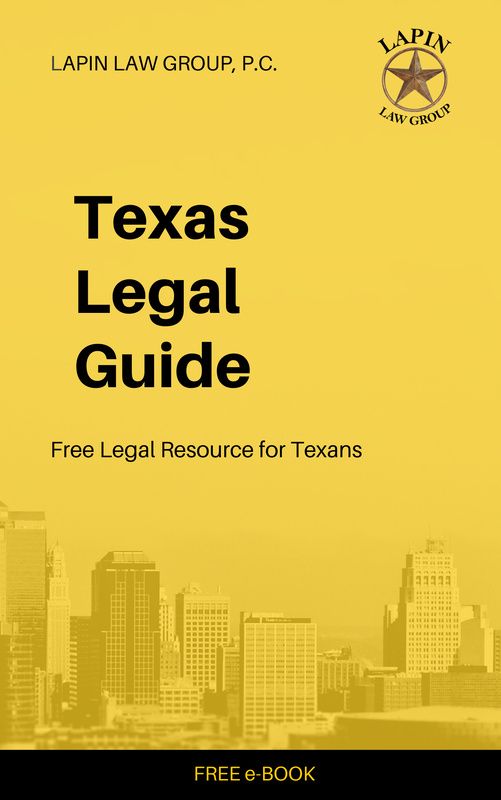In legal jargon, a person who dies without a Will (or other appropriate estate planning device) is known as an “intestate,” or is said to have died “intestate.”
Under Texas law, the property of an unmarried person who dies intestate passes to certain descendants, in an order of priority which is set by statute.
The relevant statute refers to property passing “in parcenary to the person’s kindred . . . [, and states that, in certain circumstances] the moiety passing to the decedent’s paternal kindred passes to the descendants of the person’s paternal grandfather and grandmother, and so on without end, passing in like manner to the nearest lineal ancestors and their descendants. . . .” Texas Estates Code § 201.001.
In similar fashion, the separate property and community property of a married person who dies intestate passes to certain descendants, in an order of priority set forth other statutes.
See, Texas Estates Code §§ 201.002, 201.003.
Ultimately, if there are no statutory descendants, the property of an intestate goes to the State of Texas.
“(a) If an individual dies intestate and without heirs, the real and personal property of that individual is subject to escheat.
(b) ‘Escheat’ means the vesting of title to property in the state. . . .”
Texas Property Code § 71.001.
“Okay, no problem,” one might say. “I’ll simply buy and download an inexpensive form from the Internet, fill-in the blanks, and be done. Problem solved; time to move on to something more important.”
But before heading off to that next, more important task, this person might want to consider the case of Ms. Aldrich.
Ms. Aldrich, a resident of Florida, created a Will by downloading a presumably inexpensive form from E-Z Legal Forms, an Internet legal forms provider.
Long story short, the E-Z Legal Form that Ms. Aldrich purchased did not contain all of the legal provisions that Ms. Aldrich needed.
After her death, the effect of the needed, but absent, provision of Ms. Aldrich's Will was litigated all the way to the Florida Supreme Court, which ultimately said:
Under Texas law, the property of an unmarried person who dies intestate passes to certain descendants, in an order of priority which is set by statute.
The relevant statute refers to property passing “in parcenary to the person’s kindred . . . [, and states that, in certain circumstances] the moiety passing to the decedent’s paternal kindred passes to the descendants of the person’s paternal grandfather and grandmother, and so on without end, passing in like manner to the nearest lineal ancestors and their descendants. . . .” Texas Estates Code § 201.001.
In similar fashion, the separate property and community property of a married person who dies intestate passes to certain descendants, in an order of priority set forth other statutes.
See, Texas Estates Code §§ 201.002, 201.003.
Ultimately, if there are no statutory descendants, the property of an intestate goes to the State of Texas.
“(a) If an individual dies intestate and without heirs, the real and personal property of that individual is subject to escheat.
(b) ‘Escheat’ means the vesting of title to property in the state. . . .”
Texas Property Code § 71.001.
“Okay, no problem,” one might say. “I’ll simply buy and download an inexpensive form from the Internet, fill-in the blanks, and be done. Problem solved; time to move on to something more important.”
But before heading off to that next, more important task, this person might want to consider the case of Ms. Aldrich.
Ms. Aldrich, a resident of Florida, created a Will by downloading a presumably inexpensive form from E-Z Legal Forms, an Internet legal forms provider.
Long story short, the E-Z Legal Form that Ms. Aldrich purchased did not contain all of the legal provisions that Ms. Aldrich needed.
After her death, the effect of the needed, but absent, provision of Ms. Aldrich's Will was litigated all the way to the Florida Supreme Court, which ultimately said:
|
“This unfortunate result stems not from this Court’s interpretation of Florida’s probate law[,] but [rather,] from the fact that Ms. Aldrich wrote her will using a commercially available form, an E-Z Legal Form, which did not adequately address her specific needs — apparently without obtaining any legal assistance.”
Aldrich v. Basile, Florida Supreme Court No. SC11-2147 (2014). |
An attorney undoubtedly would have charged Ms. Aldrich more for a Will than the amount she paid for the fill-in-the-blanks Will form that she purchased on the Internet from E-Z Legal Form.
Ms. Aldrich’s “savings,” however, came at a very high price: When an Executor of a Will is forced to litigate in a trial court (and in Ms. Aldrich’s case, multiple appellate courts, as well) the validity or effect of a Will, the attorney fees that are incurred in representing the Executor are paid out of the assets of the decedent’s estate. Those payments of attorney fees, in turn, reduce the amount of the inheritances which ultimately are distributed to the decedent’s heirs.
The bottom line: Even though it may be tempting to purchase inexpensive legal forms on the Internet, doing so is not worth the gamble. Don’t be a “Ms. Aldrich.” Obtain the assistance of a trained, experienced, and competent attorney.
Ms. Aldrich’s “savings,” however, came at a very high price: When an Executor of a Will is forced to litigate in a trial court (and in Ms. Aldrich’s case, multiple appellate courts, as well) the validity or effect of a Will, the attorney fees that are incurred in representing the Executor are paid out of the assets of the decedent’s estate. Those payments of attorney fees, in turn, reduce the amount of the inheritances which ultimately are distributed to the decedent’s heirs.
The bottom line: Even though it may be tempting to purchase inexpensive legal forms on the Internet, doing so is not worth the gamble. Don’t be a “Ms. Aldrich.” Obtain the assistance of a trained, experienced, and competent attorney.
Lapin Law Group offers Affordable and Experienced Estate Planning, Probate, and Trust Administration, Legal Services to Clients Throughout the State of Texas
|
For more information on the estate planning services that are available through Lapin Law Group, watch our popular video below.
|
For more information on our probate and trust administration services, watch our popular video below.
|
Learn how you can have a Lawyer Available Whenever to review your legal documents and answer your legal questions. Watch our popular video below.
GET A FREE e-BOOK
Disclaimer
The information contained in this publication is provided by Lapin Law Group, P.C., for informational purposes only and shall not constitute legal advice or serve as the basis for the creation of an attorney-client relationship. The laws and interpretation of laws discussed herein may not accurately reflect the law in the reader’s jurisdiction. Do not rely on the information contained in this publication for any purpose. If you have a specific legal question, please consult with an attorney in your jurisdiction who is competent to assist you.
Lapin Law Group, with its principal office in the Dallas-Fort Worth Metroplex, serves all 254 Texas counties.
Lapin Law Group, with its principal office in the Dallas-Fort Worth Metroplex, serves all 254 Texas counties.



